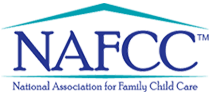Some family child care homes choose to pursue accreditation by a body in addition to their licensor and QRIS. Accrediting bodies may include NAFCC, WECAN, or others, many of which have specific philosophical orientations, such as Nature Schools or Waldorf.
The National Association for Family Child Care (NAFCC) is a membership based national association for family child care providers. The NAFCC site includes tools for NAFCC accreditation including a self-study program to help providers prepare for accreditation. There is a calendar for national events for family child care providers including the NAFCC conference, a blog about relevant topics for family child care providers, and information for families and the public regarding family child care.
If you are an NAFCC member go in to your profile and check the NAFCC box. We are partnering with NAFCC to bring you member only perks coming soon! You must have the box checked to participate!

